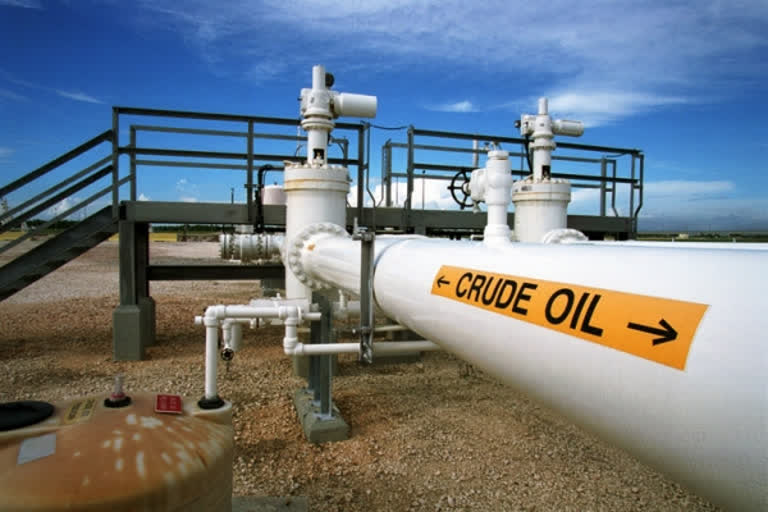New Delhi: Indian leadership will make a strong case for cutting down the crude oil prices in the international market when leaders and energy ministers of oil-producing countries and top oil industry executives will gather in New Delhi this week, according to a senior petroleum ministry official.
“We have been telling oil producing nations, including OPEC countries, to cut down the crude oil prices as it is in their interest too. If the fragile recovery in the global economy falters then it will push down the energy demand and crude oil prices will come down that will not be good for oil-producing countries,” the senior official told ETV Bharat on condition of anonymity. India imports nearly 85 per cent of its energy requirement from abroad and the country is passing through a difficult phase as crude oil prices of Brent crude imported by India in the international market are at around USD 85 a barrel, a three-year high.
According to the latest data available with the petroleum ministry, on average, India spent over USD 100 billion per year on the import of crude and gas in the last five years. The country has already spent nearly USD50 billion on the import of crude oil, gas, and other petroleum products in the first five months of the current financial year (April-August 2021).
Top decision-makers of oil-producing countries and companies will gather in New Delhi for two days this week to attend the CERAWeek conference organised by IHS Markit. These oil industry leaders includes Prince Abdulaziz bin Salman Al-Saud, Saudi Arabia's Energy Minister; US Energy Secretary Jennifer Granholm; Mohammad Sanusi Barkindo, Secretary-General of Organization of the Petroleum Exporting Countries (OPEC); and Sultan Ahmed Al Jaber, Group Chief Executive Officer, ADNOC, Minister of Industry and Advanced Technology of United Arab Emirates, among others.
Also Read: Crude oil futures dip on weak spot demand
The Indian side will be represented by Petroleum and Natural Gas Minister Hardeep Singh Puri, secretary Tarun Kapoor, Environment Minister Bhupender Yadav, and Commerce and Industries Minister Piyush Goyal, and other industry leaders. Prime Minister Narendra Modi is also expected to interact with the oil industry leaders on the sidelines of the program.
Talking about the reasons behind the high crude prices in the international market, the senior petroleum ministry official said it was primarily due to low investment in the exploration and production activity in the oil-producing nations which impacted supplies. The official said the investment in exploration and production activities in oil-producing countries declined as major consumers are moving towards non-fossil fuel sources such as solar, wind, and hydropower.
“For several years, there has been a growing interest and investment in non-fossil sources of energy which led to low investment in traditional energy sectors such as oil and gas affecting their output,” he said. Incidentally, the CERAWeek conference has a session on the issue. The session which is titled: 'Will High Prices Accelerate the Transition Away from Oil?' will be attended by OPEC Secretary-General Mohammad Sanusi Barkindo among others. In the session, oil industry leaders will discuss whether high crude oil prices, even for the short term, hasten the transition towards non-fossil fuels such as solar and wind and its impact on the global oil industry.
The crucial oil industry leaders meeting in New Delhi comes at a time when retail prices of petrol and diesel in the country are at a record high. While petrol is selling over Rs 100 a litre in national capital Delhi, diesel prices have also gone past Rs 100 a litre in several cities. Similarly, the price of domestic gas cylinders is also nearing Rs 900 per cylinder. The record energy prices have triggered a shrill debate in the country over the tax structure on petrol and diesel as both the Centre and States levy and collect taxes from the production and sale of petroleum products in the country.
Given the dual tax structure, finance minister Nirmala Sitharaman has often sought cooperation of States in reducing the retail prices. However, in absence of a joint strategy, both Centre and States continue to charge high taxes that is an attractive source of their revenue.
Also Read: Crude oil futures rise on spot demand
While the Centre collected over Rs 4.55 lakh crore from the petroleum sector in the last financial year, which also includes excise duty collection of over Rs 3.72 lakh crore, the States cumulatively collected over Rs 2.17 lakh crore. The States are also entitled to get over 40% of the Centre's tax collection from the petroleum sector under the devolution formula recommended by the finance commission.


